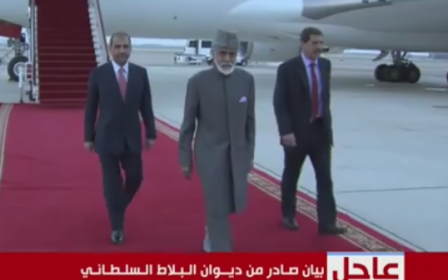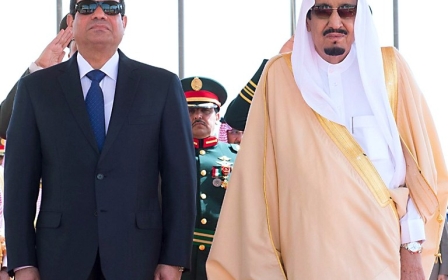Oman focus on humanitarian aid, not military offensive, in Yemen: official

Oman is ready to provide medical assistance to Yemenis injured in the ongoing civil conflict and Saudi-led intervention, according to local media reports.
The sultanate is the only member of the Gulf Cooperation Council not taking part in the bombing campaign fronted by Saudi Arabia.
“We are concentrating on the humanitarian side, not the offensive,” an unnamed government official told the Times of Oman on Friday.
On 21 March 40 injured Yemenis were transferred to hospitals in Oman, after multiple suicide bombers in Sanaa killed 142 people and wounded 351 others.
Since those deadly attacks, claimed by the Islamic State group, Saudi Arabia has led air raids against Iranian-backed Houthi rebels, who seized control of Sanaa in September and have since expanded their influence across Yemen.
The Omani official said their country was ready to help those hurt in the bombing campaign.
“Yemeni officials asked us to be on standby to receive more injured. They can be airlifted and brought over here like the first lot of patients we received last Saturday.”
The Ministry of Foreign Affairs in Oman has urged their citizens to immediately leave Yemen, as reports of civilian casualties mount, with no sign of air strikes coming to an end.
“Due to the prevailing security situation in the sisterly Yemeni Republic and in a bid to ensure the safety and security of Omani nationals, the Foreign Ministry advises all Omanis, including students at the colleges and universities in Yemen, to leave the Yemeni Republic and avoid travelling there currently for their own safety,” the ministry statement read.
Meeting in Egypt on Saturday, GCC leaders pledged to continue the bombing campaign for as long as “five to six months,” as they seek to reverse the domination of Yemen by the Houthis – viewed as a proxy of Iran by Gulf leaders.
An unnamed Gulf official, who spoke to AFP, accused Iran of providing “logistical and military support” to the Houthis.
“According to estimates, there are 5,000 Iranians, Hezbollah and Iraqi militia on the ground in Yemen,” he said, referring to the pro-Iran Lebanese movement, as well as Shiite Iraqi militiamen who are supported by Tehran.
Embattled Yemeni President Abd Rabbuh Mansur Hadi also spoke at the Arab League meeting on Saturday and urged the GCC to continue with their Operation Decisive Storm until the Houthis are pushed back.
“I call for this operation to continue until this gang surrenders and withdraws from all locations it has occupied in every province,” he said, at the Sharm el-Sheikh summit.
Hadi left the southern Yemeni city of Aden on Thursday for Saudi Arabia, stopping briefly in Oman for a “medical check-up”.
Oman has traditionally played a mediating role in the GCC, maintaining ties with Iran and facilitating dialogue to resolve disputes among regional rivals.
On Saturday morning unsubstantiated rumours on social media suggested former Yemeni president Ali Abdullah Saleh, who was ousted in 2012 following popular protests, may flee to Oman from Yemen.
Saleh was allowed to remain in Yemen as part of a GCC-brokered deal that saw him step down from the presidency in 2012. He has been accused of backing the Houthi rise and on Thursday it was reported that his compound in Sanaa was among the targets of Saudi air strikes.
New MEE newsletter: Jerusalem Dispatch
Sign up to get the latest insights and analysis on Israel-Palestine, alongside Turkey Unpacked and other MEE newsletters
Middle East Eye delivers independent and unrivalled coverage and analysis of the Middle East, North Africa and beyond. To learn more about republishing this content and the associated fees, please fill out this form. More about MEE can be found here.




